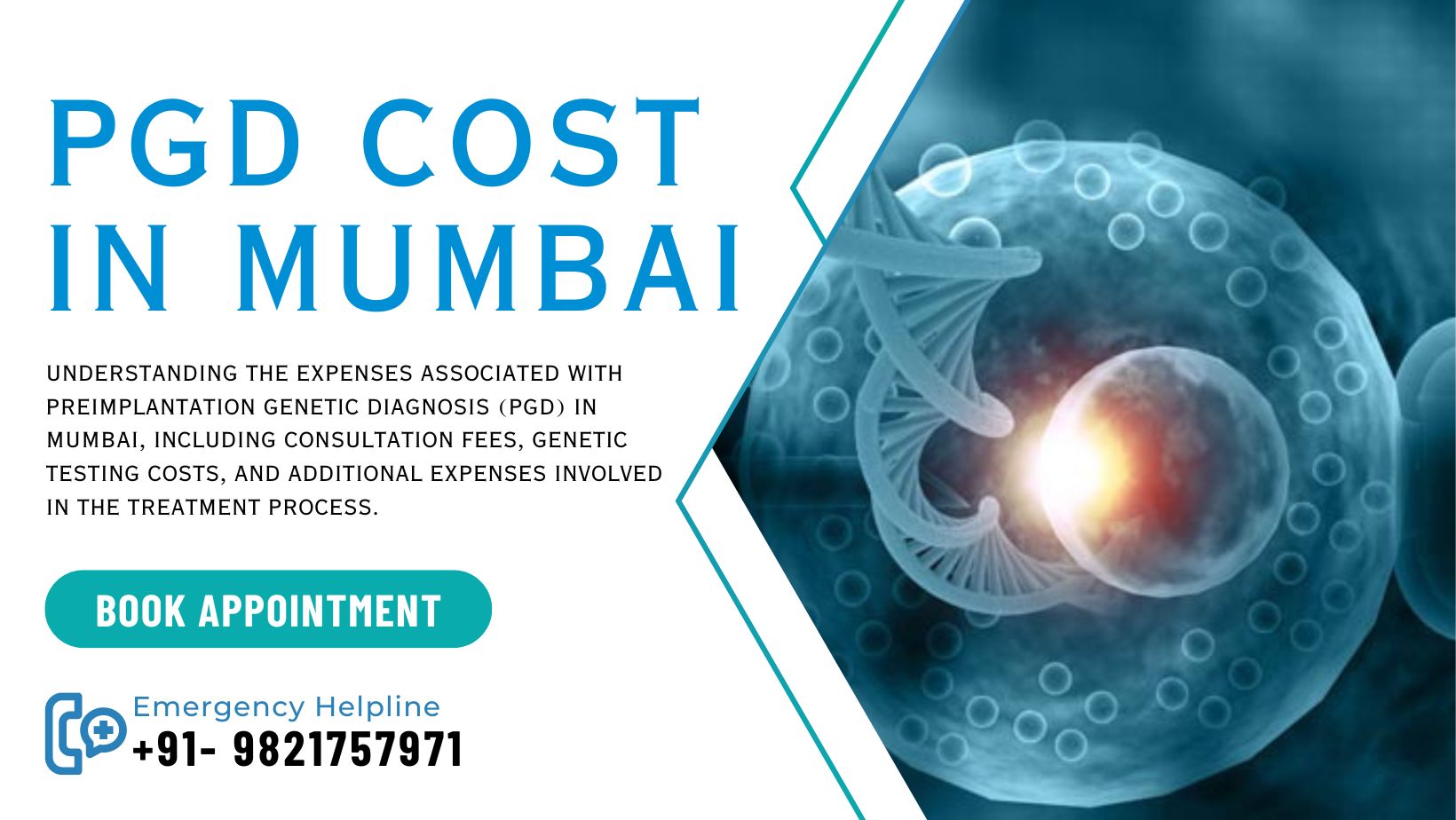Welcome to Baby Grow Fertility, your trusted destination for comprehensive fertility solutions in Mumbai. As pioneers in assisted reproductive technology, we understand the significance of Preimplantation Genetic Diagnosis (PGD) in helping couples achieve their dream of parenthood.
PGD is a groundbreaking technique that allows for the screening of embryos for genetic abnormalities before implantation, thereby increasing the chances of a successful pregnancy and the birth of a healthy baby. At Baby Grow Fertility, we offer state-of-the-art PGD services performed by experienced specialists using advanced technology.
Our commitment to excellence ensures that you receive accurate and reliable results, empowering you to make informed decisions about your fertility journey. We understand that cost can be a significant consideration, which is why we provide transparent information about the PGD Cost in Mumbai, allowing you to plan and budget accordingly.
With compassionate care, personalized attention, and a focus on achieving optimal outcomes, Baby Grow Fertility is your partner in realizing your dream of building a family. Experience the difference with us as we guide you through every step of your fertility treatment journey with expertise and support.
What is PGD?
PGD is a sophisticated reproductive technology employed during in vitro fertilization (IVF) procedures. It entails screening embryos for genetic abnormalities before implantation into the uterus. Following ovarian stimulation and egg retrieval, embryos are cultivated in a laboratory setting.
Around day 5 or 6 of development, a biopsy extracts a few cells from each embryo, which are then analyzed for specific genetic conditions or chromosomal irregularities. PGD enables clinicians to identify and select healthy embryos, minimizing the risk of passing on inherited genetic disorders. By choosing genetically sound embryos for transfer, PGD enhances the likelihood of a successful pregnancy while mitigating the chance of genetic disorders in offspring.
PGD Procedure Explained
Initial consultation and assessment: The PGD process typically begins with an initial consultation with a fertility specialist. During this counsel, the clinical history of the couple is surveyed, and any significant hereditary worries or family ancestry are examined. The richness expert will make sense of the PGD technique exhaustively, including its motivation and possible results. Additionally, the couple may undergo genetic counseling to better understand the implications of PGD for their specific situation. This initial assessment is crucial for determining the suitability of PGD for the couple and developing a personalized treatment plan.
Ovarian stimulation and egg retrieval: Once the decision to proceed with PGD is made, the woman will undergo ovarian stimulation to encourage the development of multiple eggs. This typically involves the administration of hormonal medications over a period of about 10-14 days. In the interim, the lady’s reaction to the meds is checked intently through ultrasound sweeps and blood tests. Once the eggs reach optimal maturity, they are retrieved from the woman’s ovaries through a minor surgical procedure called follicular aspiration.
In vitro fertilization (IVF) process: Following egg retrieval, the eggs are fertilized with sperm in a laboratory setting through the process of in vitro fertilization (IVF). The sperm may be obtained from the woman’s partner or from a sperm donor, depending on the couple’s circumstances. The fertilization process typically occurs within a few hours of egg retrieval, and the resulting embryos are closely monitored for signs of development over the next few days.
Embryo biopsy and genetic analysis: After the embryos have developed to a certain stage, usually around day 5 or 6, a small biopsy is performed to extract a few cells from each embryo. These cells contain hereditary material that can be broke down for explicit hereditary circumstances or chromosomal anomalies. The biopsy strategy is negligibly obtrusive and doesn’t ordinarily hurt the undeveloped organism. The extracted cells are then sent to a specialized genetic testing laboratory, where various genetic testing techniques, such as polymerase chain reaction (PCR) or fluorescence in situ hybridization (FISH), are used to analyze the genetic material.
Embryo transfer: Once the genetic analysis results are available, the couple, in consultation with their fertility specialist, can make informed decisions about which embryos to transfer into the woman’s uterus. Typically, one or two of the healthiest embryos are selected for transfer, while any remaining embryos may be cryopreserved (frozen) for future use. The undeveloped organism move strategy is somewhat basic and is like a pap smear or pelvic test.
The chose undeveloped organisms are stacked into a dainty, adaptable catheter, which is then painstakingly embedded into the lady’s uterus under ultrasound direction. The embryos are then gently released into the uterine cavity, where they can hopefully implant and develop into a healthy pregnancy. Following the embryo transfer, the woman may be prescribed medications to support implantation and early pregnancy. A pregnancy test is normally performed around fourteen days after the incipient organism move to decide whether the system was effective.
How PGD works?
Preimplantation Genetic Diagnosis (PGD) works by enabling the screening of embryos for genetic abnormalities before they are implanted into the uterus during in vitro fertilization (IVF). The process typically begins with the stimulation of the woman’s ovaries to produce multiple eggs. These eggs are then retrieved and fertilized with sperm in a laboratory dish, creating several embryos.
Once the embryos have reached a certain stage of development, usually around day 5 or 6, a small biopsy is performed on each embryo. During the biopsy, a few cells are carefully removed from the outer layer of the embryo, which contains genetic material. These cells are then analyzed using various genetic testing techniques, such as polymerase chain reaction (PCR) or fluorescence in situ hybridization.
The genetic analysis allows clinicians to identify embryos that are free from specific genetic disorders or chromosomal abnormalities. Only the healthiest embryos, those with the desired genetic makeup, are selected for transfer into the woman’s uterus. This selection process increases the chances of a successful pregnancy while reducing the risk of passing on genetic disorders to future generations.
Overall, PGD provides couples with valuable information about the genetic health of their embryos, empowering them to make informed decisions during the IVF process and increasing the likelihood of a healthy pregnancy and the birth of a healthy baby.
Factors Influencing PGD Cost in Mumbai
Clinic Reputation and Expertise: The reputation and expertise of the fertility clinic performing PGD significantly impact the cost. Clinics with a high success rate and experienced geneticists may charge higher fees for their services.
Laboratory Facilities: State-of-the-art laboratory facilities equipped with advanced technologies for genetic screening contribute to higher PGD costs. These facilities ensure accurate and reliable results, thus influencing the overall pricing.
Number of Embryos Screened: The cost of PGD in Mumbai is often calculated per embryo screened. Therefore, the number of embryos undergoing screening during IVF treatment directly affects the total cost. Couples with a larger number of embryos may incur higher expenses.
Additional Services: Additional services, such as embryo biopsy, genetic counseling, and frozen embryo transfer, may incur additional charges. It’s essential to inquire about these services and their associated costs during the initial consultation with the fertility clinic.
Geographic Location: The cost of living and operating expenses vary across different regions within Mumbai, impacting the overall pricing of PGD services. Fertility clinics located in prime areas or those offering exclusive amenities may charge higher fees.
PGD Cost in Mumbai
Preimplantation Genetic Diagnosis (PGD) is a specialized genetic testing procedure used during the in vitro fertilization (IVF) process to screen embryos for genetic disorders before implantation.
This cost includes the laboratory fees for conducting the genetic analysis of embryos, as well as any additional consultations or appointments with genetic counselors or fertility specialists. While PGD can add to the overall expenses of IVF treatment, it offers prospective parents the opportunity to select genetically healthy embryos, reducing the risk of passing on hereditary conditions to their future children
Certainly! Here’s a cost table for PGD (Preimplantation Genetic Diagnosis) in Mumbai, India:
| Service | Cost (INR) | Cost (USD) |
|---|---|---|
| PGD for Aneuploidy Screening | ₹80,000 – ₹1,00,000 | $1,060 – $1,325 |
| PGD for Monogenic Disorders | ₹1,00,000 – ₹1,50,000 | $1,325 – $1,990 |
| PGD for Chromosomal Translocations | ₹1,20,000 – ₹1,80,000 | $1,590 – $2,385 |
| IVF/ICSI (Excluding PGD) | ₹1,50,000 – ₹2,50,000 | $1,990 – $3,320 |
Navigating the Cost of PGD
Research and Comparison: Conduct thorough research to identify reputable fertility clinics in Mumbai offering PGD services. Compare the cost of PGD across multiple clinics while considering factors such as success rates, laboratory facilities, and patient reviews.
Consultation and Transparency: Schedule consultations with fertility clinics to discuss PGD procedures, associated costs, and any available financial assistance programs. Opt for clinics that maintain transparency regarding pricing and are willing to address your concerns.
Insurance Coverage: Inquire with your health insurance provider regarding coverage for fertility treatments, including PGD. While not all insurance plans cover assisted reproductive technologies, some may offer partial reimbursement for certain procedures.
Budgeting and Financial Planning: Develop a comprehensive budget that includes all anticipated costs associated with IVF treatment and PGD. Consider exploring financing options or fertility grants to alleviate financial strain.
Value and Quality: While cost is an important consideration, prioritize the quality and success rates of PGD procedures offered by fertility clinics in Mumbai. Investing in reputable clinics with proven track records may yield better outcomes in the long run.
Conclusion
In conclusion, exploring the Cost of PGD in Mumbai sheds light on the financial considerations involved in this advanced fertility treatment. While the specific costs may vary depending on individual circumstances and clinic pricing structures, understanding the components that contribute to the overall expense is crucial for informed decision-making.
Factors such as consultation fees, laboratory procedures, genetic testing, and additional treatments all play a role in determining the total cost of PGD. By carefully evaluating these factors and discussing options with healthcare providers, individuals can make confident choices that align with their fertility goals and financial capabilities, paving the way for a successful and fulfilling journey towards parenthood.




